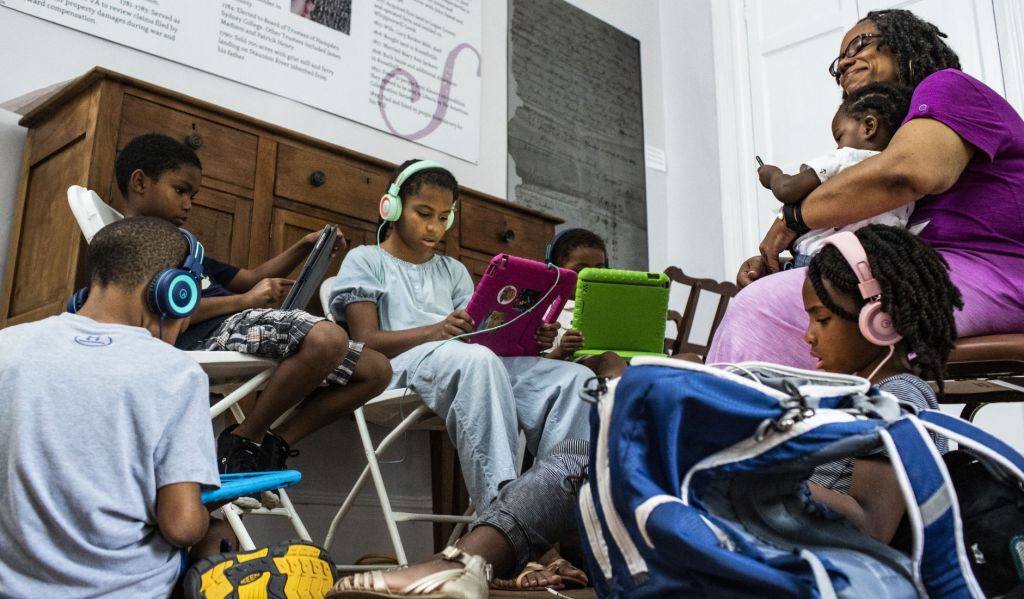Unique bonds: Descendants of slaves and the man who freed them gather for reunion
Published 7:00 pm Saturday, August 3, 2019

- Keynote speaker Traci O’Neal Ellis of Oak Park, Ill., sits with her grandchildren, nieces and nephews during a reunion for descendants of Richard Bibb and descendants of slaves owned by Bibb on Saturday, August 3, 2019, at the SEEK Museum in Russellville, Ky. (Austin Anthony/photo@bgdailynews.com)
RUSSELLVILLE – It had all the trappings of a typical family reunion: plastic coverings on tables scattered in the front yard, paper plates full of barbecue, fried chicken and banana pudding, the squeal of toddlers playing in puddles.
But the reunion Saturday afternoon attended by dozens from across the country at the historic Bibb house in Russellville was a rare, if not unprecedented, occasion.
The home of Revolutionary War Maj. Richard Bibb, built around 1819, was the site of a reunion of not only Bibb family descendants, but of the descendants of the 99 slaves Bibb emancipated decades before the Civil War. Some who attended are reportedly descended from both the Bibbs and former slaves.
The home is being converted into a museum by the West Kentucky African American Heritage Center in Russellville.
In the course of preparing the home to be an education-focused museum, center director Michael Morrow began doing genealogical research into the descendants of those Bibb freed.
Bibb first freed 29 of his slaves in 1829 and arranged for them to be shipped back to Africa, to Liberia. He then ordered in his will that the remainder of his slaves be freed upon his death. When that happened in 1839, 65 slaves, divided among five families, were given tools and land and freed. Between the two events, Bibb had also freed two other slaves.
Some of those freed stayed in Logan County in an area then known as Bibb Town, an area Morrow said he first heard about as a child. Upon learning some of the details of what had happened, he was determined to find out more.
“What was freedom for them? I spent a lifetime trying to put it together,” he said.
A partial culmination of the quest came with Saturday’s reunion. The center invited as many Bibb and freed slave descendants as it could locate across the country.
One of the descendants of the slaves freed by Bibb at Saturday’s reunion was Sharon Bibb Vaughn of Dallas.
Until her family got the letter inviting them to the reunion “I had never even heard of Russellville,” she said.
Being at the home where her ancestors were enslaved and then freed felt “surreal,” she said, adding that she also felt a “connection. This is where my ancestors started.”
Another Texas visitor was Betty Bibb Parish of Gilmer. Parish, descended directly from Richard Bibb’s family, said she felt such an event was useful.
“I think it’s good” to bring both sides together, she said, adding that she had only recently learned that some of the Bibb family at the time had strongly objected to Richard Bibb’s emancipation of his slaves.
Francine English of Louisville is a descendant of slaves freed by Bibb and attended the reunion with her sister, Denise English, also of Louisville.
Like many others, she only learned of the Bibb connection when contacted about the reunion.
“It feels good to be here,” Francine English said, adding that she can now pass on information about her ancestors to her family. “That’s something to tell my great-grandson,” she said.
Traci D. Ellis, an attorney and writer and speaker on race relations from the Chicago area, was the featured speaker at the reunion. She is descended from freed Bibb slaves who resettled in Illinois, as well, according to “pretty strong evidence,” the Bibbs.
She said when she pulled up to the house, she became unsettled – an experience magnified when she entered the palatial home and ascended to the dark, cramped attic slave quarters.
The entire experience magnified for her the question of how slaveholders justified their actions in doing things like separating families and raping women one day and attending church the next.
Ultimately, she said the efforts of the center to identify the descendants of the slaves had deep meaning for her.
“I’m so grateful … it puts flesh on my ancestors’ bones, and my bones,” she said.
During his remarks, Morrow noted that Bibb had become well-known twice in his life – in the early 1800s when he was a leader in the effort to free slaves and return them to Africa, and then in the 1970s, when the family of boxing champion Muhammad Ali was traced back to Bibb-owned slaves.
Morrow said efforts like the restoration of the Bibb house and Saturday’s reunion “help keep this story alive.”
Telling the full story of slavery and racial conditions will be a primary focus of the Bibb house museum when it opens to the public, likely next year, said Gran Clark, president of the West Kentucky African American Heritage Center.
Clark said Richard Bibb, originally from Virginia, was surrounded throughout his life by those opposed to slavery. He also became a minister in the Methodist church, which opposed slavery.
Clark said he believes the Bibb house will be the only museum in the country that was both the home of a major slaveholder and was the site of the mass emancipation of slaves.
That presents “an unbelievable opportunity to talk about the issues associated with that,” he said. “I hope a lot of good can come from this.”



